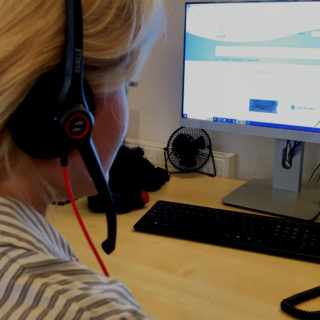Life Journeys: Anxiety in childhood and beyond
For many, feeling anxious can be a natural part of adulthood – whether that’s due to careers, relationships or finances. But anxiety in childhood can be easily dismissed or disregarded. Louisa Withers tells SANE how she felt all-encompassing anxiety surrounding school from a young age – and how important teachers were after her diagnosis with Generalised Anxiety Disorder.
When I was aged 10, in Year 6 at school, I started to develop severe anxiety surrounding education. I battled with my parents each day before school and dreaded going to sleep knowing I’d have to get up in the morning. My life became consumed with constant fear, and no one understood why.

Roots of anxiety
As a very young child, I always struggled with separation anxiety. At pre-school, my mum had to stay with me just so I would walk through the door, and at birthday parties I was always the kid crying on their parent’s lap, refusing to leave their side. I catastrophised every little event in my life, and it took its toll. My parents, who were already taking care of my older disabled sibling, were at a loss. At aged five, I developed a stutter due to my anxieties, and my mother contacted the Child and Adolescent Mental Health Service (CAMHS) to get further support.
Mental illness was present on my mother’s side of the family, so the fact I was experiencing difficulties wasn’t unusual. However, due to being a very young child, the possibility I had a disorder was dismissed and my feelings were labelled as being caused by shyness.
Despite my anxieties, school life was positive. I had access to a good education, had wonderful friends, and was never bullied. My teachers were kind and caring, and I was overall a happy and playful child.
Dizziness, nausea and panic attacks

Although I continued to display anxious tendencies, it didn’t impact my ability to enjoy life. I was a well-behaved student and took part in dancing and swimming clubs after school. It wasn’t until September 2013 that I began to struggle heavily in my day-to-day life. While the trigger wasn’t apparent at the time, it was determined later that this dramatic change was likely due to my grandfather’s cancer diagnosis earlier that year.
My anxiety started to manifest itself through feeling physically unwell. On the third day of Year 6, I started to feel dizzy and nauseous during a maths lesson. I hadn’t felt this way before, and I was scared. I left the class and hid in the bathrooms until I plucked up the courage to see the nurse and got sent home for the day.
For the following weeks, I would continually go to the nurse, saying I felt nauseous and dizzy until the staff came to the conclusion that I was faking, and dismissed me whenever I was ill throughout the rest of the year (even when my teacher requested I go home when I had flu).
I would cry every day before school. My parents had to drag me through the door each day, and I was constantly begging them to home-school me. They were frustrated, my teachers were confused, and I was scared. I was terrified of my future, knowing I’d have to spend at least the next six years in school. The thought of feeling this way every day for the next few years of my life was terrifying, and I was dreading it. I spent the whole year feeling consumed by my feelings, thinking there must have been something wrong with me. It all seemed so easy and effortless for all of my peers, and I didn’t understand why I was different.

I had my first panic attack in our before-school club. Unfortunately, I didn’t get the support I needed. I was devastated and embarrassed which made going to school all the more difficult.
Support, diagnosis and the future
There was one bright shining light during this whole experience, one particular teacher. She was the kindest I had during my time in school and with the most caring heart. She was basically a real-life Miss Honey from Matilda.
Other teachers struggled to understand what I was going through and were unable to provide support. She did everything she could to help me be able to come to school. Each morning, instead of going to the before-school club, I would go into her classroom and spend the morning chatting and helping her set up for the day. I knew that, even if I was having an awful day, there would always be a warm hug and smile waiting for me. Teachers like this have life-changing impacts on children who are struggling. I doubt that I would have been able to continue with my education without the support of my teachers.
Between the summer of finishing Year 6 and starting senior school, my grandfather died, which triggered a host of unhealthy coping mechanisms including self-harm. I was taken to CAMHS and diagnosed with Generalized Anxiety Disorder.
Luckily, anxieties surrounding school faded, and I was able to get my GCSEs and A-levels. I’ll be starting university to study psychology in the coming months. This was all due to the supportive and understanding teachers I had throughout my time in compulsory education.

While I developed other mental health conditions during my time at school, I was able to achieve my goals thanks to the adjustments my teachers put in place.
Teachers and mental health first aid
We need to pay close attention to the behaviours displayed by children. Signs of mental illness are often dismissed in young children, due to the misconception that they’re too young to experience such things. Mental illnesses can present themselves in people from a very young age, and early intervention can be life-changing.
It is also vital to support teachers. They are sometimes not adequately trained to support children with poor mental health. We need teachers, even those working with young children, to be trained in mental health first aid. Our first memories and life experiences begin in school, it’s so important that we receive the support we require to thrive.
Further reading:
Anxiety – Every Mind Matters – NHS (www.nhs.uk) – Learn more about anxiety and how to manage it here.
Emotional support – SANE – SANE offers emotional support for anyone over 16 who is affected by mental illness.
DOUBLE your donation to SANE with The Big Give HERE.





